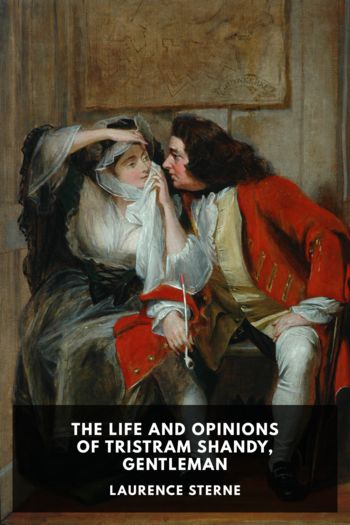The Life and Opinions of Tristram Shandy, Gentleman - Laurence Sterne (best motivational books to read txt) 📗

- Author: Laurence Sterne
Book online «The Life and Opinions of Tristram Shandy, Gentleman - Laurence Sterne (best motivational books to read txt) 📗». Author Laurence Sterne
A white bear! Very well. Have I ever seen one? Might I ever have seen one? Am I ever to see one? Ought I ever to have seen one? Or can I ever see one?
Would I had seen a white bear! (for how can I imagine it?)
If I should see a white bear, what would I say? If I should never see a white bear, what then?
If I never have, can, must, or shall see a white bear alive; have I ever seen the skin of one? Did I ever see one painted?—described? Have I never dreamed of one?
Did my father, mother, uncle, aunt, brothers or sisters, ever see a white bear? What would they give? How would they behave? How would the white bear have behaved? Is he wild? Tame? Terrible? Rough? Smooth?
—Is the white bear worth seeing?—
—Is there no sin in it?—
Is it better than a black one?
Book VI I⸺We’ll not stop two moments, my dear Sir,—only, as we have got through these five volumes, (do, Sir, sit down upon a set⸺they are better than nothing) let us just look back upon the country we have pass’d through.⸺
⸺What a wilderness has it been! and what a mercy that we have not both of us been lost, or devoured by wild beasts in it!
Did you think the world itself, Sir, had contained such a number of Jack Asses?⸺How they view’d and review’d us as we passed over the rivulet at the bottom of that little valley!⸺and when we climbed over that hill, and were just getting out of sight—good God! what a braying did they all set up together!
⸺Prithee, shepherd! who keeps all those Jack Asses? * * *
⸺Heaven be their comforter⸺What! are they never curried?⸺Are they never taken in in winter?⸺Bray bray—bray. Bray on,—the world is deeply your debtor;⸺louder still—that’s nothing:—in good sooth, you are ill-used:⸺Was I a Jack Asse, I solemnly declare, I would bray in G-fol-re-ut from morning, even unto night.
IIWhen my father had danced his white bear backwards and forwards through half a dozen pages, he closed the book for good an’ all,—and in a kind of triumph redelivered it into Trim’s hand, with a nod to lay it upon the ’scrutoire, where he found it.⸺Tristram, said he, shall be made to conjugate every word in the dictionary, backwards and forwards the same way;⸺every word, Yorick, by this means, you see, is converted into a thesis or an hypothesis;—every thesis and hypothesis have an offspring of propositions;—and each proposition has its own consequences and conclusions; every one of which leads the mind on again, into fresh tracks of enquiries and doubtings.⸺The force of this engine, added my father, is incredible in opening a child’s head.⸺’Tis enough, brother Shandy, cried my uncle Toby, to burst it into a thousand splinters.⸺
I presume, said Yorick, smiling,—it must be owing to this,⸺(for let logicians say what they will, it is not to be accounted for sufficiently from the bare use of the ten predicaments)⸺That the famous Vincent Quirino, amongst the many other astonishing feats of his childhood, of which the Cardinal Bembo has given the world so exact a story,—should be able to paste up in the public schools at Rome, so early as in the eighth year of his age, no less than four thousand five hundred and fifty different theses, upon the most abstruse points of the most abstruse theology;—and to defend and maintain them in such sort, as to cramp and dumbfound his opponents.⸺What is that, cried my father, to what is told us of Alphonsus Tostatus, who, almost in his nurse’s arms, learned all the sciences and liberal arts without being taught any one of them?⸺What shall we say of the great Piereskius?—That’s the very man, cried my uncle Toby, I once told you of, brother Shandy, who walked a matter of five hundred miles, reckoning from Paris to Shevling, and from Shevling back again, merely to see Stevinus’s flying chariot.⸺He was a very great man! added my uncle Toby (meaning Stevinus)—He was so, brother Toby, said my father (meaning Piereskius)⸺and had multiplied his ideas so fast, and increased his knowledge to such a prodigious stock, that, if we may give credit to an anecdote concerning him, which we cannot withhold here, without shaking the authority of all anecdotes whatever—at seven years of age, his father committed entirely to his care the education of his younger brother, a boy of five years old,—with the sole management of all his concerns.—Was the father as wise as the son? quoth my uncle Toby:—I should think not, said Yorick:—But what are these, continued my father—(breaking out in a kind of enthusiasm)—what are these, to those prodigies of childhood in Grotius, Scioppius, Heinsius, Politian, Pascal, Joseph Scaliger, Ferdinand de Cordouè, and others—some of which left off their substantial forms at nine years old, or sooner, and went on reasoning without them;—others went through their classics at seven;—wrote tragedies at eight;—Ferdinand de Cordouè was so wise at nine,—’twas thought the Devil was in him;—and at Venice gave such proofs of his knowledge and goodness, that the monks imagined he was Antichrist, or nothing.⸺Others were masters of fourteen languages at ten,—finished the course of their rhetoric, poetry, logic, and ethics, at eleven,—put forth their commentaries upon Servius and Martianus Capella at twelve,—and at thirteen received their degrees in philosophy, laws, and divinity:⸺But you forget the great Lipsius, quoth Yorick, who composed a work27 the day he was born:⸺They should have wiped it up, said my uncle Toby, and said no more about it.





Comments (0)